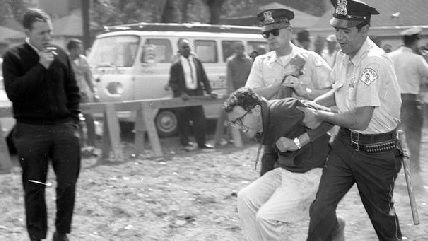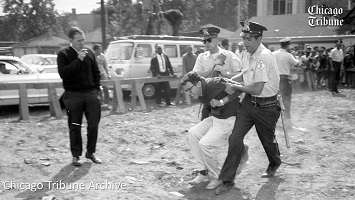Photo of Sanders Getting Dragged By Cops in '60s Protest Supposed to Win Him Black Votes or Something
Sanders has been a consistent supporter of police unions, which resist reform.


The Sanders campaign confirmed a photo from the Chicago Tribune archives depicting a young man struggling as cops drag him way was indeed Bernie Sanders when he was a student at the University of Chicago.
Sanders is making a lot of out of his civil rights activism in the 1960s as a reason Democrats should support him in the 2016 presidential primary. "A picture is worth a thousand words," said Jane Sanders, Bernie's wife, while responding to perceived attempts by Hillary Clinton "to cast him as not having much of a civil rights record."
A picture may be worth a thousand words but the 1994 crime bill, which set in motion many of the "law and order" policies that have contributed to the problems of mass incarceration and criminalization of marginalized communities in the last two decades, was far longer than a thousand words. Sanders, a member of the House of Representatives at that time, voted for the bill, which was supported by Hillary Clinton and signed into law by her husband Bill.
And the 1994 crime bill wasn't the first time Sanders adopted political positions that aligned with the interests seeking to expand the police industrial complex. When he ran for mayor of Burlington in 1981, he received the support of the city's police union. I am, in fact, unaware of any public statement made by Bernie Sanders to acknowledge the role police unions play in perpetuating problems in the criminal justice system, one of the (oft underreported) lynchpins of the Black Lives Matter critique of police violence.
The Economist covers Sanders' most recent efforts to appeal specifically to African-American Democrats—he's enlisted the help of actor Danny Glover and rapper Killer Mike and launched a tour of historically black colleges and universities. The idea that members of any demographic group should vote the same way denies marginalized people agency, marginalizing them even further. There is, however, a widely understood racial disparity in the criminal justice system. And while Sanders and Clinton may acknowledge that racial disparity, their policy proposals are similarly bereft of an analysis that could actually dismantle the system of police violence. Victims of that system know this no matter how many pictures or endorsements come out.


Show Comments (86)